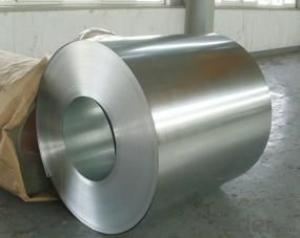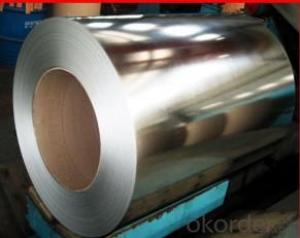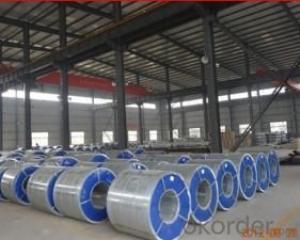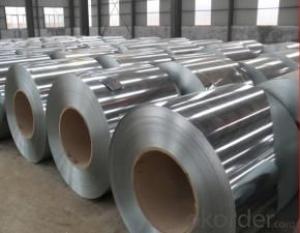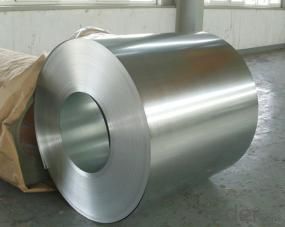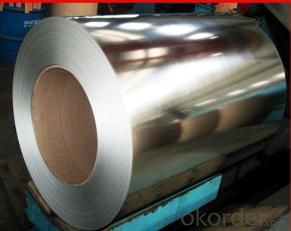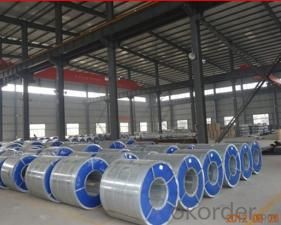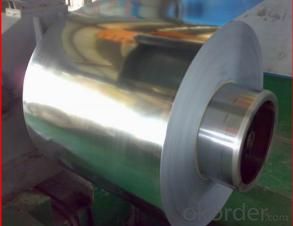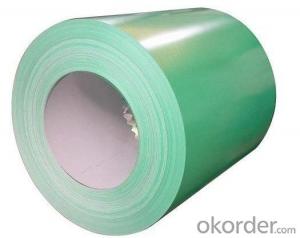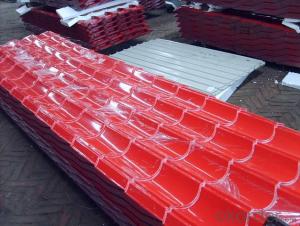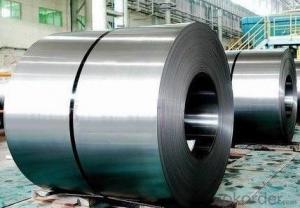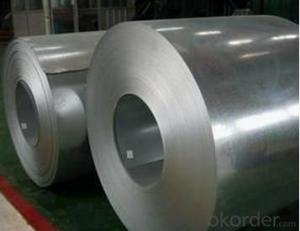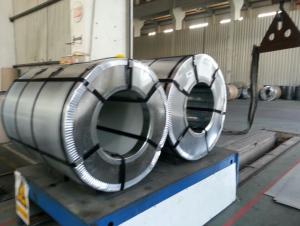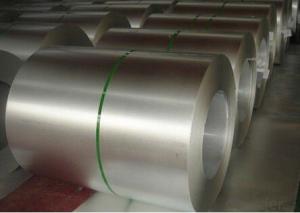Hot Dipped Galvanized Steel Coils for Steel Structure building
- Loading Port:
- Shanghai
- Payment Terms:
- TT OR LC
- Min Order Qty:
- 30 m.t.
- Supply Capability:
- 10000 m.t./month
OKorder Service Pledge
OKorder Financial Service
You Might Also Like
Basic Info.
Model NO.:Hot Dipped Galvanized Steel Coil
Surface Treatment:Galvanized
Certification:ISO, SGS, BV, RoHS, IBR
Technique:Cold Rolled
Standard:ASTM, JIS, GB, AISI, DIN, BS
Application:Roofing, Wall, Corrugated, Structure...
Edge:Mill
Stock:Stock
Steel Grade:Dx51d, SPCC, SGCC, CGCC, S350gd
Name:Hot Dipped Galvanized Steel Coil
Thickness:0.14-1.2mm
Width:600-1250mm
Surface:Oiled, Galvanized, Chromated
Zn Coating:40-275GSM
Spangle:Zero, Small, Big, Regular
Coil Weight:3-10tons
Coil ID:508/610mm
Certificate:BV, ISO
Test:QA-QC-Mtc
Export Markets:Global
Additional Info.
Packing:Standard Export Package
Standard:0.14-1.2mm*762-1250mm
HS Code:7905000000
Production Capacity:30000 Tons/Year
Product Description
1. Galvanized steel coil simple introduction:
Galvanized steel coil means that steel coils has gone through a chemical process
To keep it from corroding, so this protective metal, zinc layers, does not get rusty as easily. The coating also gives the steel a more durable, hard to scratch finish.
(1)Thickness:0.14-1.2mm
(2)Width:600-1250mm
(3)Material:SGCC,DX51D,S350GD,SPCC,CGCC
(4)Zn:40-275gsm
(5)Surface:oiled,chromated
(6)Application: Corrugated,Wall,Roofing,Structure and so on
2. Galvanized steel coil technical processing:
1)Uncoiled and sheared
2)Cleaned using a caustic solution, which can remove oil/grease, dirt, and paint
3)Entry looper to revised and then annealing furnace
4)Steel is dipped into the molten zinc bath
5)Cooled in a quench tank to reduce its temperature
6)Post treatment and crimper
3. Galvanized steel coil quality control:
Strict procurement process---skillful technical workers---final products inspection
(resistance to corrosion, salt spray test, exposure test, machinability, thermal resistance)
---standard packing
4. Galvanized steel coil advantages:
1)Zinc coating has good adhesion
2)Resistant to corrosive factors
3)High strength&quality
4)Strict quality control system
5)Standard export sea-worthy packing
5. Why choose us?
1).Advantages: We have two production line of PPGI and two lines for the galvanized steel coil, total yearly output is about 500000mt Also we have 56 professional salesperson from three international sales department, a group of technical engineers
And skillful quality control inspector.
2). Special technology support: We have two production line of pre-painted steel coil
And two lines for the galvanized steel coil, total yearly output is about 500000mt. In
Order to meet our customers new requirements, We also can manufacture the special
Products, such as Printed, Filmed, Pressed, Matte steel coil and the full hard G550
Galvanized steel and galvalume steel.
3). Conform the international quality standard: All products for export, according to the
International quality standard of Europe, Japan, Russia and America to produce.
- Q: What are the common defects in steel coil surface finishes?
- Common defects in steel coil surface finishes can include scratches, pits, rust, oil stains, and uneven coating. Scratches can occur during handling and transportation, and they can affect the overall appearance and performance of the steel coil. Pits are small depressions on the surface caused by a variety of factors such as impurities in the steel or improper processing. Rust can form when the steel coil is exposed to moisture or corrosive environments, and it can weaken the structural integrity of the material. Oil stains can occur if the coil is not properly cleaned before or after processing, leaving unsightly marks on the surface. Uneven coating can happen during the application of protective coatings or paints, resulting in areas with different levels of protection and aesthetics. It is important to address these defects to ensure the quality and durability of the steel coil for its intended applications.
- Q: What are the common applications of coated steel coils?
- The excellent properties and versatility of coated steel coils make them suitable for a wide range of applications in various industries. Some common uses of coated steel coils include: 1. Construction industry extensively employs coated steel coils for roofing, cladding, and wall panels. The coating ensures long-lasting structures by providing superior corrosion resistance, durability, and weatherability. 2. In the automotive industry, coated steel coils are widely used for manufacturing body panels, bumpers, and chassis parts. The coatings enhance aesthetics, protect against corrosion, and improve paint adhesion for a flawless finish. 3. Coated steel coils find utility in the production of household appliances like refrigerators, washing machines, and ovens. The coatings provide an attractive, smooth finish while protecting the steel from moisture and environmental factors. 4. Heating, Ventilation, and Air Conditioning (HVAC) systems commonly utilize coated steel coils for manufacturing ductwork, air handling units, and heat exchangers. The coatings ensure resistance against corrosion and improve system efficiency. 5. The furniture industry also makes use of coated steel coils for manufacturing cabinets, tables, and chairs. The coatings provide a decorative finish while protecting the steel from wear and tear. 6. Electrical equipment production, including switchboards, control panels, and enclosures, involves the use of coated steel coils. The coatings provide insulation and protection against electrical conductivity, ensuring durability. 7. In the packaging industry, coated steel coils are used for manufacturing cans, containers, and closures. The coatings act as a barrier against moisture and prevent contamination, ensuring the preservation and safety of packaged products. In conclusion, coated steel coils offer corrosion resistance, durability, aesthetics, and protective properties, making them suitable for various applications across industries. From construction to automotive, appliances to furniture, and even in electrical equipment and packaging, coated steel coils play a crucial role in delivering high-quality products and ensuring long-lasting performance.
- Q: What is the process of pickling and oiling steel coils?
- The process of pickling and oiling steel coils involves several steps to ensure the quality and protection of the steel. Firstly, pickling is the process of removing impurities and scale from the surface of the steel coil. This is typically done by immersing the coil in an acid bath, such as hydrochloric acid or sulfuric acid, which helps to dissolve any oxides, rust, or other contaminants present on the surface. This step is crucial as it prepares the steel for further processing and prevents any potential defects or corrosion. After pickling, the steel coils are rinsed with water to remove any residual acid and then dried. Once the coils are clean and dry, they are then coated with a layer of oil to provide temporary corrosion protection and lubrication during subsequent handling and transport. The oil coating helps to prevent the steel from rusting or oxidizing before it is further processed or used in various applications. The oiling process can be done in several ways. One common method is by applying the oil using a roller or brush, ensuring that the entire surface of the coil is evenly coated. Alternatively, the coils can be passed through a bath or spray chamber where the oil is applied. The type of oil used can vary depending on the specific requirements of the steel and its intended use. Some common oils include mineral oil, synthetic oils, or specialized rust-preventive coatings. Once the oiling process is complete, the steel coils are typically stacked, wrapped, or packaged for storage or transportation. It is important to handle the coils carefully to avoid damaging the oil coating and compromising the corrosion protection. Overall, pickling and oiling steel coils are essential steps in the steel manufacturing process to ensure the quality, cleanliness, and protection of the steel, ultimately extending its lifespan and enhancing its performance in various applications.
- Q: How are steel coils inspected for surface cleanliness using cleanliness tests?
- Steel coils are inspected for surface cleanliness using cleanliness tests to ensure that they meet the required quality standards. These tests involve various methods to assess the presence of contaminants, such as dirt, oil, grease, rust, or scale, on the surface of the steel coils. One commonly used cleanliness test is the visual inspection, where trained inspectors visually examine the surface of the coils for any visible contaminants. They look for any signs of staining, discoloration, or foreign substances that may affect the quality of the steel. Another cleanliness test is the wipe test, where a clean cloth or wipe is used to wipe the surface of the steel coil. This cloth is then analyzed for the presence of contaminants using techniques like gravimetric analysis or solvent extraction. The amount of contaminants collected on the cloth can be measured, providing an indication of the cleanliness of the steel surface. Surface roughness tests are also performed to assess cleanliness. A roughness gauge is used to measure the roughness of the steel surface, which can indirectly indicate the presence of contaminants. If the surface roughness measurements are higher than the specified limits, it suggests the presence of contaminants affecting the cleanliness of the steel. In addition to these tests, cleanliness tests may also involve techniques like wetting tension measurement, water break test, or contact angle measurements. These tests evaluate the surface energy and wetting properties of the steel, which can be affected by the presence of contaminants. By conducting cleanliness tests, steel coils can be thoroughly inspected for surface cleanliness. These tests help in identifying any potential contaminants that may compromise the quality and performance of the steel. By ensuring the surface cleanliness of steel coils, manufacturers can provide high-quality products that meet the stringent requirements of various industries.
- Q: How do steel coils contribute to sustainability in construction?
- Steel coils contribute to sustainability in construction in several ways. Firstly, steel is a highly durable material that has a long lifespan. Steel coils are used in the construction of various structural components like beams, columns, and frames, ensuring the stability and strength of buildings. By using steel coils, the resulting structures require less maintenance and have a longer service life, reducing the need for frequent repairs or replacements. This durability enhances the sustainability of construction projects by reducing the overall environmental impact associated with material waste and energy consumption. Secondly, steel is a highly recyclable material. Steel coils can be easily recycled and reused in new construction projects. The recycling process of steel has a significantly lower environmental impact compared to the production of new steel. Recycling steel coils helps to conserve natural resources, reduce the extraction of raw materials, and minimize energy consumption in steel production. By incorporating recycled steel coils into construction projects, the demand for new steel production is reduced, resulting in lower greenhouse gas emissions and a smaller carbon footprint. Furthermore, steel is a material that can be prefabricated off-site. This means that steel coils can be manufactured in factories in a controlled environment, minimizing construction waste and improving construction efficiency. Prefabricating steel coils reduces the amount of material waste generated on-site and decreases the need for transportation of construction materials, thereby reducing air pollution and energy consumption during construction. Additionally, steel is known for its high strength-to-weight ratio, which allows for lighter and more efficient structures. By using steel coils, construction projects can optimize the use of materials, resulting in reduced material consumption and lessening the overall environmental impact. The lightweight nature of steel coils also facilitates easier transportation, reducing fuel consumption and associated emissions during delivery. In summary, steel coils contribute to sustainability in construction through their durability, recyclability, prefabrication capabilities, and high strength-to-weight ratio. By utilizing steel coils, construction projects can minimize waste, conserve resources, reduce energy consumption, and decrease the environmental impact, ultimately promoting a more sustainable built environment.
- Q: I have a steel garage, it looks worn out hauled away? How can I maintain / repair it?
- Maintaining Your Steel Garage: # Clean your garage doors with a mild detergent using a soft car brush four times a year. # Clean the doors whenever they wash you car (washing your garage doors regularly will reduce the build up of corrosive elements) #Avoid using any abrasive cleaners or corrosive chemicals on or around your garage doors. # Avoid using salt near the garage door as it may corrode the door elements / hardware. Or you can paint your steel garage: #Step 1 Clean the door using a low-pressure sprayer. Combine 5 gallons of warm water and 1 cup of low-phosphate detergent to clean the surface. Rinse well and dry the surface. #Step 2 Lightly sand and smooth the scratches which do not go through to the metal substrate. Dust off sand residue. For a door with a baked on finish, use a powdered cleanser (diluted with water) and a soft brush to rough up the surface for better paint adhesion; do not use sand paper. Rinse with water and allow it to dry. #Step 3 Apply primer to areas where scratches permeate to the metal substrate to avoid future rusting or corrosion. Allow it to dry. #Step 4 Paint the door with an even coat of latex exterior house paint. If your steel garage has a dent check out the site(the last source link at the bottom)
- Q: What are the advantages of using steel coils?
- There are several advantages of using steel coils. Firstly, steel coils are highly durable and have a longer lifespan compared to other materials, making them ideal for long-term use. Additionally, steel coils have excellent strength-to-weight ratio, allowing them to withstand heavy loads without compromising structural integrity. They also provide superior resistance to corrosion, making them suitable for various environments, including high humidity or coastal areas. Furthermore, steel coils can be easily recycled, making them an environmentally friendly choice. Overall, the advantages of using steel coils include durability, strength, corrosion resistance, and sustainability.
- Q: What are the major challenges faced by steel coil manufacturers?
- The major challenges faced by steel coil manufacturers can be categorized into several key areas. 1. Raw Material Costs: One of the primary challenges is the fluctuating prices of raw materials, such as iron ore and coal, which are essential for steel production. Manufacturers have to constantly monitor and adjust their pricing strategies to mitigate the impact of these fluctuations and maintain profitability. 2. Global Competition: Steel coil manufacturers face intense competition from both domestic and international players. Globalization has led to an increase in the availability of steel coils from various regions, making it crucial for manufacturers to differentiate themselves through quality, pricing, and customer service to remain competitive. 3. Technological Advancements: The steel industry is constantly evolving and adopting new technologies. Manufacturers need to invest in modern equipment and machinery to improve efficiency, reduce costs, and meet stringent quality standards. Keeping up with technological advancements can be challenging, especially for smaller or less financially stable manufacturers. 4. Environmental Regulations: Steel production is a resource-intensive process that can have a significant impact on the environment. Governments worldwide are imposing stricter regulations on emissions, waste disposal, and energy consumption, which poses a challenge for steel coil manufacturers. Compliance with these regulations requires significant investments in pollution control technologies and sustainable practices. 5. Skilled Workforce: The steel industry requires a skilled workforce with expertise in various areas such as metallurgy, engineering, and operations. However, attracting and retaining skilled employees can be challenging, as the industry faces a shortage of qualified personnel. Manufacturers need to invest in training and development programs to ensure a competent workforce and maintain operational excellence. 6. Economic Volatility: Steel coil manufacturers are highly sensitive to economic fluctuations. During periods of economic downturns, demand for steel products decreases, leading to excess capacity and lower profit margins. On the other hand, during economic booms, manufacturers may face challenges in meeting increased demand and ensuring timely delivery. 7. Transportation and Logistics: Steel coils are bulky and heavy, making transportation and logistics a significant challenge for manufacturers. Optimizing supply chain management, coordinating with freight partners, and ensuring timely delivery of products to customers across various geographies can be complex and costly. In conclusion, steel coil manufacturers face several challenges, including raw material costs, global competition, technological advancements, environmental regulations, skilled workforce requirements, economic volatility, and transportation logistics. Overcoming these challenges requires proactive strategies, continuous improvement, and a focus on innovation to remain competitive in the industry.
- Q: What are the different steel coil packaging methods?
- There are several different steel coil packaging methods, including using steel strapping or banding to secure the coils, using plastic or metal end caps to protect the edges of the coils, and using wooden or steel pallets to stack and transport the coils. Additionally, some steel coils may be wrapped in protective film or paper to prevent damage during shipping and storage.
- Q: How are steel coils used in the manufacturing of automotive suspension systems?
- Steel coils are used in the manufacturing of automotive suspension systems as they provide the necessary support and stability to withstand the weight and movement of the vehicle. These coils are typically shaped into springs and installed in the suspension system to absorb shocks, maintain proper ride height, and improve overall handling and comfort for the driver and passengers.
Send your message to us
Hot Dipped Galvanized Steel Coils for Steel Structure building
- Loading Port:
- Shanghai
- Payment Terms:
- TT OR LC
- Min Order Qty:
- 30 m.t.
- Supply Capability:
- 10000 m.t./month
OKorder Service Pledge
OKorder Financial Service
Similar products
Hot products
Hot Searches
Related keywords
